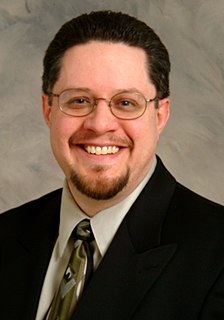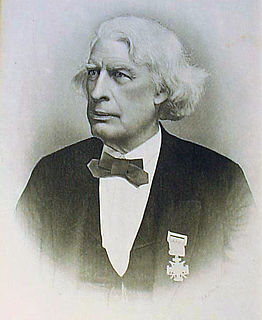A Quote by Melville Fuller
The framers of the constitution employed words in their natural sense; and, where they are plain and clear, resort to collateral aids to interpretation is unnecessary, and cannot be indulged in to narrow or enlarge the text; but where there is ambiguity or doubt, or where two views may well be entertained, contemporaneous and subsequent practical construction is entitled to the greatest weight.
Related Quotes
For there have risen many who have given to the plain words of Holy Writ some arbitrary interpretation of their own, instead of its true and only sense, and this in defiance of the clear meaning of words. Heresy lies in the sense assigned, not in the word written; the guilt is that of the expositor, not of the text.
I conduct very few interviews with veterans. The contemporaneous, or near-contemporaneous, record for WWII is so spectacularly deep that latter-day recollections are largely unnecessary for a historian. Of course, in considering any account, I'm looking for additional sources that can confirm or enlarge that version of events.
I'm not naive. Sometimes interpretation is more of an art than a science. There are those who would label interpretation absolutely anything a judge might do or, two, the text of a statute or the Constitution. But it seems to me there comes a point where a judge is using his own creativity and purpose and crosses the line between interpreting a text written by somebody else and in a sense creating something new.
Our amended Constitution is the lodestar for our aspirations. Like every text worth reading, it is not crystalline. The phrasing is broad and the limitations of its provisions are not clearly marked. Its majestic generalities and ennobling pronouncements are both luminous and obscure. This ambiguity of course calls forth interpretation, the interaction of reader and text. The encounter with the Constitutional text has been, in many senses, my life's work.
Republicans, supposed defenders of limited government, actually are enablers of an unlimited presidency. Their belief in strict construction of the Constitution evaporates, and they become, in behavior if not in thought, adherents of the woolly idea of a 'living Constitution.' They endorse, by their passivity, the idea that new threats justify ignoring the Framers' text and logic about shared responsibility for war-making.
Every single person in the government swears an oath to the very same constitution, to abide by the laws in pursuance of this constitution, and they all have the responsibility to follow its plain words....If a judge makes a ruling that is contrary to the plain words of the Constitution, then it's not law, it's just his bad opinion!
On every question of construction (of the Constitution) let us carry ourselves back to the time when the Constitution was adopted, recollect the spirit of the debates, and instead of trying what meaning may be squeezed out of the text, or invented against it, conform to the probable one in which it was passed.
If it be said that the legislative body are themselves the constitutional judges of their own powers, and that the construction they put upon them is conclusive upon the other departments, it may be answered, that this cannot be the natural presumption, where it is not be collected from any particular provisions in the Constitution.
The constitution of the United States is to receive a reasonable interpretation of its language, and its powers, keeping in view the objects and purposes, for which those powers were conferred. By a reasonable interpretation, we mean, that in case the words are susceptible of two different senses, the one strict, the other more enlarged, that should be adopted, which is most consonant with the apparent objects and intent of the Constitution.
We current Justices read the Constitution in the only way that we can: as Twentieth Century Americans. We look to the history of the time of framing and to the intervening history of interpretation. But the ultimate question must be, what do the words of the text mean in our time. For the genius of the Constitution rests not in any static meaning it might have had in a world that is dead and gone, but in the adaptability of its great principles to cope with current problems and current needs.
The axioms of physics translate the laws of ethics. Thus, "the whole is greater than its part;" "reaction is equal to action;" "the smallest weight may be made to lift the greatest, the difference of weight being compensated by time;" and many the like propositions, which have an ethical as well as physical sense. These propositions have a much more extensive and universal sense when applied to human life, than when confined to technical use.
The Cabal is of two kinds, theoretical and practical, with the practical Cabala, which is engaged in the construction of talismans and amulets, we have nothing to do. The theoretical is divided into the lineal and dogmatic. The dogmatic is nothing more than the summary of the metaphysical doctrine taught by the Cabalist doctors. It is, in other words, the system of the Jewish philosophy.

































